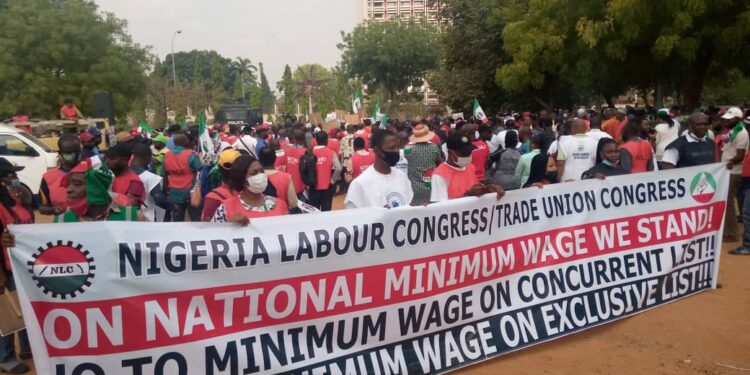Bismarck Rewane, chairman of the Presidential Technical Advisory Committee on the Implementation of the National Minimum Wage (PTAC), on Thursday, said both the Federal Government and state governments had no excuses not to pay the N30,000 minimum wage as they had the capacity to conveniently do so if they were willing.
Rewane, an economic and financial expert, disclosed this while featuring as a guest on Channels Television programme ‘Politics Today’ monitored by Daily Independent.
Nigerian workers, under the umbrella of the Nigerian Labour Congress (NLC) and Trade Union Congress (TUC), had staged a nationwide protest, kicking against the plan by both the Federal and state governments to freely negotiate the minimum wage with their workers in line with the nation’s federal system.
About a fortnight ago, the House of Representatives introduced a bill which, according to the sponsor, Hon. Garba Mohammed, would create room for a free negotiation of the minimum wage with federal and state workers in line with the nation’s federal system.
But the workers stressed that it was an attempt by some state governors and members of the National Assembly to short-change them.
According to Rewane, who is the Chief Executive Officer, Financial Derivatives Company Limited, the minimum wage law signed by the President in April 2019 made it a crime for anyone who employs more than five people to pay less than N30,000 minimum wage both in the public and private sector.
He also added that the revenues of most states of the federation had gone up by hundred percent just as the minimum wage was also increased from N18,000 to N30,00.
He said: “The law that the President signed in 2019 after our team submitted our report was that everybody in Nigeria, public or private sector, that employs more than five people must pay a minimum wage of N30,000 a month to its workers.
“And that anybody who pays less than N30,000 a month to any group of people of five and above is committing a crime as far as the National Minimum Wage Law is concerned.
“On the issue of whether it is law that should be passed by the federal or state does not arise. As of today, it is a federal law and it is binding on all citizens, both in the private and public sector.
“The willingness to pay is the issue. Even if you have billions of naira and you refuse to pay, that will be your own prerogative.But that cannot be allowed. You will be committing a crime according to the Nigerian statute.
“The oil producing states were getting N9 billion a month but now are getting N18 billion a month; that is a hundred percent increase.If you go to the others who do not have oil, Imo State was getting N3 billion a month in 2017; Imo State is now getting about N5 billion a month in 2019. In other words, inspite of the fact that the minimum wage has increased from N18,000 to N30,000, their revenue profile has improved by a substantially more amount than their wage bill has increased.
“So, both the states and the Federal Government have the ability to pay and that has been provided for in the Appropriation Act of 2019, 2020, and 2021.
“In spite of the pandemic, you’ll find out that the profile of the revenues of the Nigerian government, both at the federal and state levels, is much more improved because subsidies have reduced, VAT has increased, and also there are lots of cost reflective tariffs that have increased.”
While justifying the protest by the workers, Rewane said Nigerians needed to know how the governors had been utilising the revenues accruing to them both in the state and the federal monthly allocations.
“The question is, what do you now do with the money you have earned? Nigerian people are interrogating and saying we want to know how you have used the money to improve education, healthcare, and other facilities for the people to get a benefit.
“It is important to set the records straight for anyone who says that the states don’t have the resources to pay. The states have the resources to pay and can meet the obligation if they are willing to do it.”









